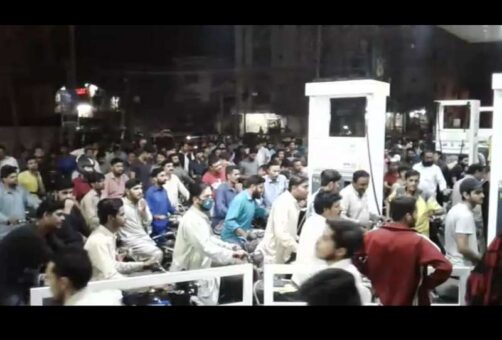The latest petroleum prices in Pakistan from March 23, 2024 are: petrol at Rs 279.75 per liter and high speed diesel (HSD) Rs 285.56 per liter.
These prices will remain applicable till March 31, 2024.
In the last revision of petroleum prices on February 29, 2024, Pakistan has decided to maintain the price of petrol while slashing the rate of high-speed diesel for the upcoming fortnight starting March 16, 2024.
This decision, marking the first fortnightly review under the current administration, was announced by the Finance Division on Friday.
According to the statement released by the Finance Division, the price of petrol will remain steady at Rs279.75 per litre for the next fortnight. Meanwhile, the rate of high-speed diesel has been reduced by Rs1.77 per litre, bringing it down to Rs285.56 per litre.
These revised prices, set to take effect from 12 am on March 16, will remain unchanged until March 31, providing a semblance of stability for consumers amidst fluctuating global oil markets.
The latest adjustments in fuel prices also extend to other petroleum products. The Ministry of Finance disclosed that the price of kerosene oil has been decreased to Rs188.86 per litre, marking a reduction of Rs1.35 per litre. Similarly, the price of light diesel oil has been trimmed by Rs2.12 per litre.
An analysis of the petroleum pricing structure reveals that the government levies various charges on fuel products. Currently, consumers pay Rs60 per litre of petrol as Petroleum Development Levy (PDL). Additionally, an Internal Freight Equalization Margin (IFEM) of Rs5.69 per litre, an Oil Marketing Companies (OMCs) margin of Rs7.87 per litre, and a dealers margin of Rs8.64 per litre are included in the retail price of petrol.
Similarly, for high-speed diesel, the government imposes a PDL of Rs60 per litre. Alongside, consumers bear an IFEM of Rs4.24 per litre, an OMCs margin of Rs7.87 per litre, and a dealers margin of Rs8.64 per litre.
These intricate pricing mechanisms reflect the multifaceted nature of the energy sector, where various stakeholders contribute to the final cost borne by consumers.
The decision to maintain petrol prices comes amid global concerns regarding energy security and stability. With geopolitical tensions and supply disruptions looming, policymakers face the challenge of balancing domestic needs with international market dynamics.
Furthermore, the reduction in diesel rates may provide relief to various sectors reliant on diesel-powered machinery and transportation. From agriculture to logistics, the downward adjustment could alleviate some financial burdens faced by businesses and consumers alike.
